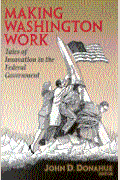Everybody knows federal agencies are brain-dead leviathans. Everybody knows that the watchword of federal management is “that’s the way we’ve always done it.” Everybody knows that any creativity within American government shows up only in the cities and states. Everybody’s wrong. In 1995 the Ford Foundation’s annual “Innovation in American Government” award competition was opened up to federal candidates and a third of the winners since then have been federal institutions. This book profiles the 14 federal award winners from 1995 to 1998 and challenges the conventional wisdom about the federal bureaucracy’s capacity to adapt. Examples include the Consumer Product Safety Commission, which figured out how to identify and act upon business and government’s shared stake in keeping dangerous products out of consumers’ hands; and the Wage and Hour inspectors in the Labor Department, who deployed market leverage to put pressure on the garment-industry scofflaws whose sweatshops had evaded conventional enforcement. The stories show how pressure, promises, and professional pride can galvanize federal managers and front-line workers to overcome what are admittedly imposing impediments to change, and persevere with new ways to deliver on their missions. And they illustrate the unfashionable truth that innovation is within Washington’s repertoire after all. Copublished with the Council for Excellence in Government
Author
Edited by
John D. Donahue is the Raymond Vernon Senior Lecturer in Public Policy at the Harvard Kennedy School of Government. His books include Collaborative Governance: Private Roles for Public Goals in Turbulent Times (Princeton University Press), written with Richard J. Zeckhauser.

